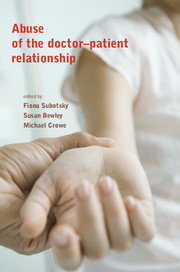Book contents
- Frontmatter
- Contents
- List of figures, tables and boxes
- List of contributors
- Foreword
- Introduction: mapping the territory
- 1 The ethical importance of boundaries to intimacy
- 2 The patient's perspective: impact and treatment
- 3 Teaching ethics and ethical behaviour to medical students
- 4 With the benefit of hindsight: lessons from history
- 5 The prevalence of boundary violations between mental health professionals and their clients
- 6 Psychiatry: responding to the Kerr/Haslam Inquiry
- 7 The general practitioner and abuse in primary care
- 8 Boundaries and boundary violations in psychotherapy
- 9 Sexual therapies: ethical guidelines, vulnerabilities and boundaries
- 10 Obstetrics and gynaecology: a special case?
- 11 Nurses as abusers: a career perspective
- 12 Medical management: governance and sexual boundary issues
- 13 Dealing with offending doctors: sanctions and remediation
- 14 Defending doctors: the protection society's experience
- 15 Regulation and its capacity to minimise abuse by professionals
- 16 The role of the General Medical Council
- Appendix 1 Extract from Vulnerable Patients, Safe Doctors
- Appendix 2 Codes of ethics of psychiatric associations in other countries
- Appendix 3 Guidance from the Council for Healthcare Regulatory Excellence
- Appendix 4 Examples of determinations by the General Medical Council's Fitness to Practise panels
- Appendix 5 Website resources and information
- Index
- Plate section
15 - Regulation and its capacity to minimise abuse by professionals
Published online by Cambridge University Press: 02 January 2018
- Frontmatter
- Contents
- List of figures, tables and boxes
- List of contributors
- Foreword
- Introduction: mapping the territory
- 1 The ethical importance of boundaries to intimacy
- 2 The patient's perspective: impact and treatment
- 3 Teaching ethics and ethical behaviour to medical students
- 4 With the benefit of hindsight: lessons from history
- 5 The prevalence of boundary violations between mental health professionals and their clients
- 6 Psychiatry: responding to the Kerr/Haslam Inquiry
- 7 The general practitioner and abuse in primary care
- 8 Boundaries and boundary violations in psychotherapy
- 9 Sexual therapies: ethical guidelines, vulnerabilities and boundaries
- 10 Obstetrics and gynaecology: a special case?
- 11 Nurses as abusers: a career perspective
- 12 Medical management: governance and sexual boundary issues
- 13 Dealing with offending doctors: sanctions and remediation
- 14 Defending doctors: the protection society's experience
- 15 Regulation and its capacity to minimise abuse by professionals
- 16 The role of the General Medical Council
- Appendix 1 Extract from Vulnerable Patients, Safe Doctors
- Appendix 2 Codes of ethics of psychiatric associations in other countries
- Appendix 3 Guidance from the Council for Healthcare Regulatory Excellence
- Appendix 4 Examples of determinations by the General Medical Council's Fitness to Practise panels
- Appendix 5 Website resources and information
- Index
- Plate section
Summary
Background
As detailed elsewhere in this volume, in recent years there have been several highly publicised inquiries into cases of abuse perpetrated by health professionals (see, for example, Box 6.1, p. 65, on Michael Haslam; Box 6.2, p. 66, on William Kerr; Box 10.1, p. 115, on Clifford Ayling; and Box 11.1, p. 131, on David Britten). Each case involved serious sexual abuse of multiple patients over extended periods and the inquiries highlighted how opportunities to detect problems had been missed. Boundary transgressions are of concern to regulators, both in respect of the severity of harm caused to the individuals who are abused, and to the extent that the media reporting such cases of abuse diminishes trust and confidence in the health professions.
In 2006, in response to the Ayling and Kerr/Haslam Inquiries, the Department of Health commissioned the Council for Healthcare Regulatory Excellence (CHRE) to undertake a programme of regulatory research aimed at protecting patients by minimising the likelihood of boundary violations. Recognising boundary issues to be a significant patient safety issue, the CHRE had already initiated an internal programme of work in this area, commissioning POPAN (the Prevention Of Professional Abuse Network, later Witness) to compare the guidance on this issue produced by all of the UK healthcare regulators (Coe et al, 2005). That research highlighted significant discrepancies between them. The CHRE work included a review and analysis of the literature on boundary violations (Halter et al, 2007), and the production of guidelines for professionals, patients, educators, and fitness-to-practise panels dealing with boundary allegations (Council for Healthcare Regulatory Excellence, 2008a–c). In keeping with its statutory remit, the CHRE's guidance was targeted primarily at the statutorily regulated healthcare professions, although psychotherapists and other nonregulated professions were also represented throughout the project.
The lack of systematic data collection in the UK makes it hard to detect the prevalence of boundary violations with accuracy (see Chapter 5). However, proxy markers, including complaints and fitness-to-practise findings, indicate that boundary concerns are not uncommon among regulated health professions. Safeguarding Patients (Department of Health, 2007a) states that very broad-brush estimates in other countries suggest that the prevalence could be as high as 6–7% of health professionals, drawing on research provided to the CHRE (Coe et al, 2005).
- Type
- Chapter
- Information
- Abuse of the Doctor-Patient Relationship , pp. 177 - 189Publisher: Royal College of PsychiatristsPrint publication year: 2010



